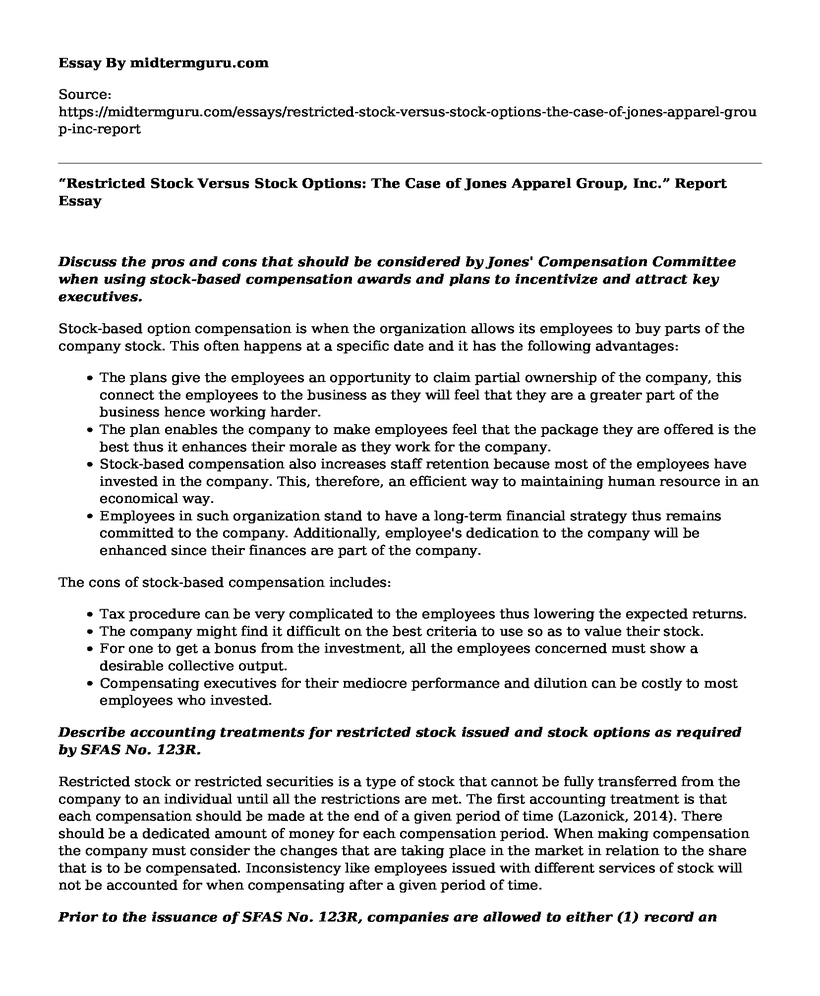Discuss the pros and cons that should be considered by Jones' Compensation Committee when using stock-based compensation awards and plans to incentivize and attract key executives.
Stock-based option compensation is when the organization allows its employees to buy parts of the company stock. This often happens at a specific date and it has the following advantages:
- The plans give the employees an opportunity to claim partial ownership of the company, this connect the employees to the business as they will feel that they are a greater part of the business hence working harder.
- The plan enables the company to make employees feel that the package they are offered is the best thus it enhances their morale as they work for the company.
- Stock-based compensation also increases staff retention because most of the employees have invested in the company. This, therefore, an efficient way to maintaining human resource in an economical way.
- Employees in such organization stand to have a long-term financial strategy thus remains committed to the company. Additionally, employee's dedication to the company will be enhanced since their finances are part of the company.
The cons of stock-based compensation includes:
- Tax procedure can be very complicated to the employees thus lowering the expected returns.
- The company might find it difficult on the best criteria to use so as to value their stock.
- For one to get a bonus from the investment, all the employees concerned must show a desirable collective output.
- Compensating executives for their mediocre performance and dilution can be costly to most employees who invested.
Describe accounting treatments for restricted stock issued and stock options as required by SFAS No. 123R.
Restricted stock or restricted securities is a type of stock that cannot be fully transferred from the company to an individual until all the restrictions are met. The first accounting treatment is that each compensation should be made at the end of a given period of time (Lazonick, 2014). There should be a dedicated amount of money for each compensation period. When making compensation the company must consider the changes that are taking place in the market in relation to the share that is to be compensated. Inconsistency like employees issued with different services of stock will not be accounted for when compensating after a given period of time.
Prior to the issuance of SFAS No. 123R, companies are allowed to either (1) record an expense for the fair market value of the options or (2) record an expense for the intrinsic value of the options over the vesting period of those options under SFAS No. 123. Why do you believe that Jones and other companies elected to adopt the fair market value method of determining stock option expense before FASB issued SFAS No. 123R in 2004?
Their intention was to develop a platform where they can properly estimate the value of company equity for compensation. Unique nature of each type of investment is taken into consideration when determining securities safety and marketability in an already congested market. Jones and the companies also recognized valuation techniques that are utilized to ensure that equity valuation for each employee is granted as deserved. The pricing model is used to determine the fair option for the shares in the market (Carlson and Vogel, 2006). Factors like the expectation of future changes that might change prices were also among other factors that Jones and other companies considered while opting for stock-based compensation. Consequently, company volatility in the past or currently is also an important factor to consider when opting for stock-based compensation before FASB issued SFAS (Carlson and Vogel, 2006). Modifying or rectifying company volatility can also be considered so as to determine whether the future of share stands to change or remain the same. Holders of the shares should be made aware that they do not stand to lose their investment if company volatility leads to losses to the business. Those are some of the aspects that Jones and other companies considered before FASB issues SFAS in 2004.
References
Carlson, R. L., & Vogel, T. J. (2006). Restricted Stock versus Stock Options: The Case of Jones Apparel Group, Inc. Issues in Accounting Education Teaching Notes, 21(4), 8-24.
Lazonick, W. (2014). Numbers Show Apple Shareholders Have Already Gotten Plenty. Harvard Business Review Blog.
Cite this page
"Restricted Stock Versus Stock Options: The Case of Jones Apparel Group, Inc." Report. (2022, Sep 28). Retrieved from https://midtermguru.com/essays/restricted-stock-versus-stock-options-the-case-of-jones-apparel-group-inc-report
If you are the original author of this essay and no longer wish to have it published on the midtermguru.com website, please click below to request its removal:
- Marketing Management in Ben and Jerrys Ice-Cream Company
- Evaluation Essay on Starbucks Company
- Paper Example on Ethical Principles in Downsizing Departmental Workforce
- IKEA's Approach to Innovation - Essay Sample
- Political Action Committees: Raising Funds for Political Candidates - Essay Sample
- Samsung: Error and OD Intervention - Essay Sample
- Business Operations: Competitors, Suppliers, and Macro-Environment Factors - Essay Sample







